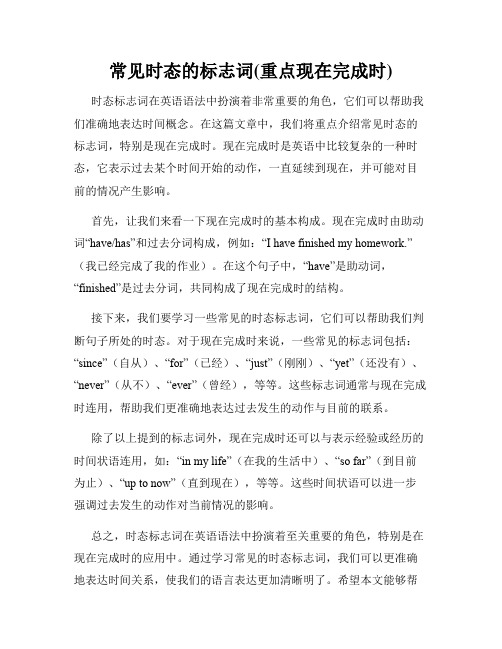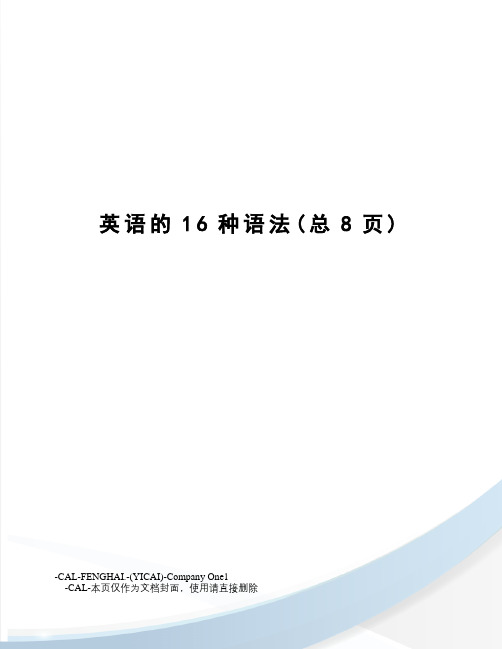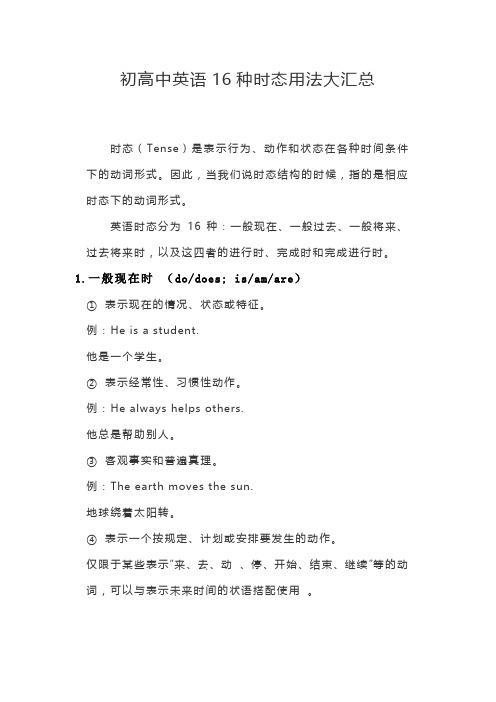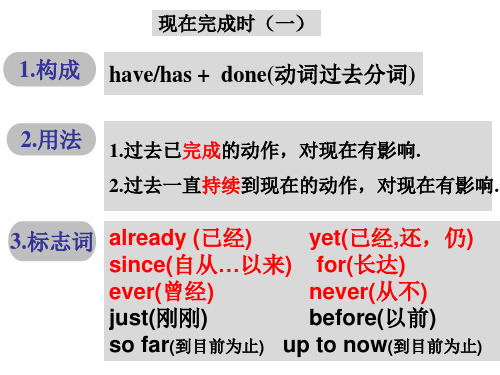各种完成时
各种时态的构成方法

各种时态的构成方法
1一般现在时:动词原形
2一般过去时:动词过去式
3一般将来时:will (shall) + 动词原形
4现在进行时:be(am, is ,are) + 动词现在分词
5现在完成时:have (has) + 动词过去分词
6现在完成进行时:have/has been + 动词现在分词
7过去进行时:was / were + 动词现在分词
8过去完成时:had + 动词过去分词
9过去完成进行时:had been + 动词现在分词
10将来进行时:will be + 动词现在分词
11将来完成时:will have + 动词过去分词
12将来完成进行时:will have been + 动词现在分词
13过去将来时:would + 动词过去分词
14过去将来进行时:would be + 动词过去分词
15过去将来完成时:would have + 动词过去分词
16过去将来完成进行时:would have been + 动词现在分词。
现在完成时

对划线部分提问
1. I’ve already had dinner.
What have you already done?
2. He has just finished his homework.
What has he just done?
3. Mum’s cooked the dinner. .
He has gone to Shanghai. 他(已经)去上海了。
He has been to Shanghai. 他(曾经) 去过上海。
He went to Shanghai last week. 上周他[做了一件事:那就是]去了上海
He has been to Shanghai. 他(曾经)到/去过上海 [在他人生中曾经有过这样的 经历,但他人现在肯定不是在上海而是回来了] He has gone to Shanghai. 他已经去上海了 [也许刚动身出发,也许已经到了,也许 还在路上,反正他人不在这里] He has been in Shanghai for 10 years. 他呆在上海迄今为止已经10年了 [现在还在上海没 有离开呢] He lived in Shanghai for 10 years. 以前他在上海住过10年 [现在不在上海了] 含 义 上 的 差 别 由 时 态 导 致 的 辨 析 这 些 句 子
时间状语:for+一段时间;since+过去点时间。
三,过去分词的构成
1.直接加-ed。如:play-played 2.以字母e结尾的直接加d 。如:namenamed 3.以辅音字母加y结尾的,变y为i加ed。如: carry-carried 4.重读闭音节且末尾只有一个辅音字母, 双写这个辅音字母再加-ed。如:stopstopped
常见时态的标志词(重点现在完成时)

常见时态的标志词(重点现在完成时)时态标志词在英语语法中扮演着非常重要的角色,它们可以帮助我们准确地表达时间概念。
在这篇文章中,我们将重点介绍常见时态的标志词,特别是现在完成时。
现在完成时是英语中比较复杂的一种时态,它表示过去某个时间开始的动作,一直延续到现在,并可能对目前的情况产生影响。
首先,让我们来看一下现在完成时的基本构成。
现在完成时由助动词“have/has”和过去分词构成,例如:“I have finished my homework.”(我已经完成了我的作业)。
在这个句子中,“have”是助动词,“finished”是过去分词,共同构成了现在完成时的结构。
接下来,我们要学习一些常见的时态标志词,它们可以帮助我们判断句子所处的时态。
对于现在完成时来说,一些常见的标志词包括:“since”(自从)、“for”(已经)、“just”(刚刚)、“yet”(还没有)、“never”(从不)、“ever”(曾经),等等。
这些标志词通常与现在完成时连用,帮助我们更准确地表达过去发生的动作与目前的联系。
除了以上提到的标志词外,现在完成时还可以与表示经验或经历的时间状语连用,如:“in my life”(在我的生活中)、“so far”(到目前为止)、“up to now”(直到现在),等等。
这些时间状语可以进一步强调过去发生的动作对当前情况的影响。
总之,时态标志词在英语语法中扮演着至关重要的角色,特别是在现在完成时的应用中。
通过学习常见的时态标志词,我们可以更准确地表达时间关系,使我们的语言表达更加清晰明了。
希望本文能够帮
助大家更好地理解时态标志词的用法,提高英语写作和口语表达的能力。
英语的16种语法

英语的16种语法(总8页) -CAL-FENGHAI.-(YICAI)-Company One1-CAL-本页仅作为文档封面,使用请直接删除16种英语时态(经典收藏版)英语时态分为16种,如下表所示:各时态结构及用法1. 一般现在时(do/does; is/am/are)①表示现在的情况、状态和特征。
例:He is a student.他是一个学生。
②表示经常性、习惯性动作。
例:He always helps others.他总是帮助别人。
③客观事实和普遍真理。
例:The earth moves the sun.地球绕着太阳转。
④表示一个按规定、计划或安排要发生的动作。
(常用于列车、客车、飞机或轮船时刻表)例:The next train leaves at 3 o'clock this afternoon.下一趟火车今天下午3点开车。
⑤主将从现:在时间、条件和让步状语从句中经常用一般现在表示将的来事情。
例:If it rains tomorrow, we will stay at home.如果明天下雨,我们会待在家里。
2. 现在进行时(am/is/are doing)①表示此时此刻正在发生的事情。
例:He is listning to the music now.他现在正在听音乐。
②表示目前一段时间内一直在做的事情,但不一定此时此刻正在做。
例:I am studying computer this term.这个学期我一直在学习计算机。
③现在进行时可以表示将来的含义。
瞬时动词的进行一定表将来。
例: I am leaving.我要离开了。
持续动词的进行只有有将来的时间状语或有将来语境中才表将来。
例: I am travelling next month.下个月我要去旅行。
④现在进行时与频度副词连用,表示说话者或褒义或贬义的感情色彩。
例: He is always helping others.他总是帮助别人。
英语语法 初高中英语16种时态用法大汇总

初高中英语16种时态用法大汇总时态(Tense)是表示行为、动作和状态在各种时间条件下的动词形式。
因此,当我们说时态结构的时候,指的是相应时态下的动词形式。
英语时态分为16种:一般现在、一般过去、一般将来、过去将来时,以及这四者的进行时、完成时和完成进行时。
1.一般现在时(do/does; is/am/are)①表示现在的情况、状态或特征。
例:He is a student.他是一个学生。
②表示经常性、习惯性动作。
例:He always helps others.他总是帮助别人。
③客观事实和普遍真理。
例:The earth moves the sun.地球绕着太阳转。
④表示一个按规定、计划或安排要发生的动作。
仅限于某些表示“来、去、动、停、开始、结束、继续”等的动词,可以与表示未来时间的状语搭配使用。
常见的用法是:飞机、火车、轮船、汽车等定期定点运行的交通方式。
例:The next train leaves at 3 o'clock this afternoon.下一趟火车今天下午3点开车。
⑤在时间、条件和让步状语从句中经常用一般现在(有时也用现在完成时)表示将的来事情。
(即:主将从现原则)例:I will call you as soon as I arrive at the airport.我一到机场就会给你打电话。
When you have finished the report, I will have waited for about 3 hours.等你完成这份报告的时候,我就已经等了将近3个小时了。
2. 现在进行时(am/is/are doing)①表示此时此刻正在发生的事情。
例:He is listning to the music now.他现在正在听音乐。
②表示目前一段时间内一直在做的事情,但不一定此时此刻正在做。
例:I am studying computer this term.这个学期我一直在学习计算机。
英语语法-现在完成时

—No, he _h_a_s_g_o_n_e_t_o_ the school library. He left five minutes ago.
Exercise
做过,泛泛而谈,标志词,用现在完成时 做过,有明确的过去时间,用一般过去时
It is + 时间段 since +一般过去时的句子.
1. 他的爷爷已经去世2年了。 It is 2 years since his grandpa died.
2. Nick 参军3年了. It is 3 years since Nick joined the army.
3. 他离开深圳好长时间了。 It is a long time since he left Shenzhen. 4. 这本书我已借了4个月了. It is 4 months since I borrowed the book .
3) I’ve just finished Oliver Twist. 我刚看完《雾都孤儿》这本书。
现在完成时构成 have/ has + done (过去分词)
原形-过去式ed-过去分词ed pick → picked → picked wish → wished → wished
like → liked → liked phone→ phoned → phoned
She hasn’t told us the news yet. 3. The rain has already stopped. (改一般疑问句)
Has the rain stopped yet? 4. I have waited here for two hours. (划线提问)
高三英语过去完成时、将来完成时、现在完成进行时、将来进行时
课后作业一、真题演练:单句语法1. When I die, I ____________(give) everything to you.2. That was definitely not an attractive idea, so I politely declined her invitation, .____________(close) m y book and walked away.3. His fear of failure __________(keep) him from classroom games that other students played with joyousabandon.4. _______________(speak) out your inner feeling won’t make you feel ashamed, on the contrary,5. _____________(complete) the project as planned, we’ll have to work two more hours a day.6.It was raining lightly when I___61___ (arrive) in Yangshuo just before dawn.7. This cycle 48 (go) day after day:The walls warm up during the day and cool off during the night and are thus always a timely offset(抵消) for the outside temperatures.8. In 1969,the pollution was terrible along the Cuyahoga River near Cleveland,Ohio.It 61 (be) unimaginable that it could ever be cleaned up.9. Be patient!Tai Chi 66 (call) “shadow boxing” in English.It asks you to act like water:10.Unless some extra money (find),the theatre will close11.When a new day breaks,the walls have given up their heat and are now cold enough 46 (cool) the house during the hot day;at the same time,they warm up again for the night.12. In addition to their simple beauty,what makes the adobe dwellings admirable is their ability to “air condition” a house wi thout 44 (use) electric equipment.13. The adobe dwellings(土坯房) 41 (build) by the Pueblo Indians of the American Southwest are admired by even the most modern of architects and engineers.二、单选题1. When I was young, I ________ with my grandma in the countryside, which is unforgettable.A. livedB. have livedC. was livedD. had lived2. –Excuse me, is the book Gone with the Wind by Margaret Mitchell available now?-Sorry, but it _________ so well that we don’t have any in store.A. sellsB. is soldC. has soldD. has been sold3. The tourism of Linyi _________ rapid growth over the last decade. Now it’s the second most visited city in Shandong Province.A. sawB. had seenC. is seeingD. has seen4. Great changes _____place in my hometown during the past three decades.A. tookB. have takenC. were takenD. have been taken5.Leave me alone. I ________ an article all the afternoon and haven’t finished yet.A. writeB. have been writingC. have writtenD. wrote6. When the power of love _______ the love of power, the world will likely be in peace.A. overcomesB. will overcomeC. is overcomingD. overcame7. Mr. Black ________ Shanghai in a few days. Shall we have a party?A. leavesB. is leavingC. leftD. has left8. –Look, it _________ again.–Yeah. This is the third snow we __________ this spring.A. will snow, are havingB. has snowed, had hadC. is snowing, have hadD. snows, have had9. Mr. White ____ in our school for nearly forty years before he retired last month.A. workedB. has workedC. had workedD. would work10. The project ________ to developing the economy and reducing poverty when it is completed.A. has contributedB. had been contributedC. will contributeD. is contributed11. Nelson Mandela __________ peacefully at his Johannesburg home on Thursday, President Jacob Zuma said.A. diesB. diedC. has diedD. was died12. –I thought you _____________ for vacation tomorrow.-I had planned, but I have a very important meeting to attend tomorrow.A. will leaveB. are leavingC. have leftD. were leaving13. Our manager ________for Shanghai in a few days and he has asked me to find out when the earliest plane ________ next Wednesday.A. is leaving, takes offB. will leave, is taking offC. leaves, will take offD. is to leave, is going to take off14. I’m calling about the apartment you ______the other day .Could you tell me more about it?A .advertised B. had advertised C. were advertising D. will advertise15. Whenever you______a present, you should think about it from the receiver’s point of view.A. boughtB. have boughtC. will buyD. buy16. I walked slowly through the market, where people ______ all kinds of fruits and vegetables. I studied the prices carefully and bought what I needed.A. sellB. were sellingC. had soldD. have sold17. The twins, who _______ their homework, were allowed to play badminton on the playground.A. will finishB. finishC. have finishedD. had finished18. The journey was tiring! All the seats in the train _______. I had to stand all the way.A. were occupiedB. would be occupiedC. would occupyD. had occupied19. Yesterday afternoon, I ______my homework when Mary called.A. had doneB. was doingC. would doD. am doing20. Close the door of fear behind you, and you ______ the door of faith open before you.A. sawB. have seenC. will seeD. are seeing21. Tommy is planning to buy a car. By next month ,he____ enough for a used one.A. saves B .saved C. will save D. will have saved22. She was surprised to find the fridge empty; the child _____ everything!A. had been eatingB. had eatenC. have eatenD. have been eating23. Despite the previous rounds of talks, no agreement______ so far by the two sides.A. has been reachedB. was reachedC. will reachD. will have reached24. More expressways _______in Sichuan soon to promote the local economy.A. are being builtB. will be builtC. have been builtD. had been built25 After school we went to the reading-room to do some reading, only to be told that it _____.A. was decoratedB. had decoratedC. had been decoratingD. was being decorated三、语法填空(共10小题;每小题1.5分,满分15分)阅读下面短文,在空白处填入1个适当的单词或括号内单词的正确形式。
高中英语动词时态用法详解
高中英语动词时态用法详解时态(Tense)是表示行为、动作和状态在各种时间条件下的动词形式。
因此,当我们说时态结构的时候,指的是相应时态下的动词形式。
英语时态分为16种:一般现在、一般过去、一般将来、过去将来时,以及这四者的进行时、完成时和完成进行时。
下面是16种时态的谓语动词形式和具体用法,高考必考的是前10种时态,同学们需要重点掌握。
1.一般现在时 (do/does; is/am/are)① 表示现在的情况、状态或特征。
例:He is a student.他是一个学生。
② 表示经常性、习惯性动作。
例:He always helps others.他总是帮助别人。
③ 客观事实和普遍真理。
例:The earth moves the sun.地球绕着太阳转。
④ 表示一个按规定、计划或安排要发生的动作。
仅限于某些表示“来、去、动 、停、开始、结束、继续”等的动词,可以与表示未来时间的状语搭配使用 。
常见的用法是:飞机、火车、轮船、汽车等定期定点运行的交通方式。
例:The next train leaves at 3 o'clock this afternoon.下一趟火车今天下午3点开车。
⑤ 在时间、条件和让步状语从句中经常用一般现在(有时也用现在完成时)表示将的来事情。
(即:主将从现原则)例:I will call you as soon as I arrive at the airport.我一到机场就会给你打电话。
When you have finished the report, I will have waited for about 3 hours.等你完成这份报告的时候,我就已经等了将近3个小时了。
2. 现在进行时(am/is/are doing)① 表示此时此刻正在发生的事情。
例:He is listning to the music now.他现在正在听音乐。
② 表示目前一段时间内一直在做的事情,但不一定此时此刻正在做。
have的用法
have用法
Have:助动词:构成各种完成时(现在、过去、将来)和完成进行时;
have/has done; had done; will/shall done
实义动词:1、表示“具有”、“拥有”时为状态动词,与have got可互换,
一般不用于进行时或被动语态。
2、表示eat、drink、enjoy、take等意思时,可用于各种时态。
Eg:have lunch;have a cup of coffee;have a good time;have a
bath
对以上各种完成时举例:
现在完成时:He has just gone to Beijing.
过去完成时:The film had begun before we got to the cinema.
将来完成时:By the time you get home I will have cleaned the house from top to
bottom.
(注:将来完成时表示将来某一时间以前已经完成的动作,并对将来产生影响。
一般它的时间状语为:before/by+将来时间;by the time引
导从句)。
英语时态:现在完成时和现在完成进行时区别、过去完成时及现在完成时区别
现在进行时和现在完成进行时区分:区分have done和have been doing,我们需要从两个方面来讨论:一、完成时态和完成进行时态本身意义的差异;二、要结合动词的不同延续特点.首先我们来看两种时态的意义差异两者根本区别是:完成进行时强调动作持续的过程(emphasis on duration),完成时强调动作的结果或成就(emphasis on achievement).具体来讲,现在完成进行时have been doing强调的是在一段时期内某项活动的持续性,强调的是动作本身.现在完成时have done那么是强调动作产生的结果或取得的成就,而不是动作本身.二者的这种区别我们从下面的这些例句可以很好地领悟到:(2) a. My hands are very dirty. I’ve been painting the house. b. I have painted the house green. The house was white, but now it’s green.思维分析:句a中have been painting表示painting动作一直在持续,活动还没有结束,所以才有my hands are very dirty这样的现状.句a意思是“我的手很脏,我现在一直在给房间刷漆〞.句b中have painted表示painted动作已经结束,而且动作导致的结果是the house was white, but now it’s green房间现在是绿色的了.现在完成时表示动作业已完成, 而完成进行时却不一定如此I’ve made a cake. 我做了一个蛋糕.〔已做好〕I’ve been making a cake. 我一直在做一个蛋糕. 〔不一定做好了She’s painted a picture. 她画了一幅画.〔已画好〕She’s been painting a picture. 她在画一幅画.〔可能还没画好〕强调时间长度用完成进行时比拟好:I’ve been coughing all night. 我咳了一整夜.〔比I’ve coughed all night. 更能强调咳得久〕All the time she’s been sitting there in silence. 她一直静坐在那里.All these years we’ve been trying to get in touch with him. 这些年来我们一直在设法和他联系. 许多静态动词都只能用于完成时而不能用于完成进行时:I’ve known that for a long time. 这事我已经知道很久了.The strike has lasted six months. 这次罢工已经持续了6个月.Nobody has seen him since last week. 从上周起就没人见到过他.raise in salary all the time. 他一直盼着加薪.但当意思发生转变时也可能用于完成进行时:I’ve been thinking of doing so for a long time. 我好久以来一直想这样做.Tom has been seeing about a work permit for you. 汤姆一直在设法帮你取得工作许可证.有少数动词用两种时态都可以,意思差异不大,如:They have been working very well this term. 这学期他们学习很好. They have worked very well this term.It has been raining for two hours. 下了两个小时的雨. It has rained for two hours.过去完成时一、过去完成时的概念与结构特点概念:过去完成时表示在过去某一时间或动作之前已经发生或完成了的动作,即“过去的过去〔 past-in-the-past 〕〞。
- 1、下载文档前请自行甄别文档内容的完整性,平台不提供额外的编辑、内容补充、找答案等附加服务。
- 2、"仅部分预览"的文档,不可在线预览部分如存在完整性等问题,可反馈申请退款(可完整预览的文档不适用该条件!)。
- 3、如文档侵犯您的权益,请联系客服反馈,我们会尽快为您处理(人工客服工作时间:9:00-18:30)。
already; yet; by this time; just; ever; never;
now; before; lately 等。
现在完成时考点
现在完成时与时间状语up to now, so far, up till now等连用。 例如: So far we have finished 9 passages.
将来完成时:will have +动词过去分词 将来完成时表示将来某一时刻之前已经完成的动作。 例如:I’ll have finished my work by this time tomorrow. Before long he will have forgotten all about it. 考点:
完成时:
1、现在完成时:have/has+动词的过去 分词 2、过去完成时:had+动词的过去分词 3、将来完成时:will have+动词的过去 完成时 4.现在完成进行时:will have been doing.
1. 表示动作已经完成,强调过去 发生的某一 动作对现在造成的影响和结果。一般过去 时仅仅说明动作在过去,不强调对现在的 影响。 常与一些时间状语连用:如:
将来完成时与by+将来的时间连用。
Mary will have taken 58 credits by the time she graduates.
练习: 1. I hope they D this road by the time we come back next year. A. have repaired C. are to repair B. will repair D. will have repaired
Marry是瞬间性动作,不能和for +时间段 的状语连用。要表示状态的用 has been married to sb.“和某人结婚”是marry to sb.
过去完成时:had+动词的过去分词
过去完成时 表示“过去的过去”,业已发生的动作或 存在的状态。
例如:When we arrived at the station, the train had left. 考点: 1. 过去完成时与by+表示过去的时间状语连用。
3. 有些瞬间性动词不能和表示一段时 间的时间状语连用。要连用时须用状 态动词。成对的词有: Become/be; die/be dead; leave/ be away; join the army/serve the army…
2.
It is the first/second…time that 从句。 的从句中 一般用 现在完成时。 另外:“It is/ has been + 一段时间+ since 从句…”中,从句动词通常用过 去时,主句用完成时。
3. The painter say they (finish)will have finished the downstairs room by Wednesday. 4. It is raining hard, but by the time the class is over, the rain (stop) will have stopped . 5. By the end of the month, we surely (find)will have founda satisfactory solution to the problem.
3. The Chinese people are doing things no one (do) has done so far. 4. Up tieal of money on books. 5. In these five years, the foundation (基金会) (collect) has collected a large amount of money. There (be) have been several such occurrences in the past few weeks.
1. He said, “I A a lot of new words by the end of last year.”
A. had already learnt B. would have already learnt C. have already learnt D. already learnt
例如:By the end of last month, they had completed all their work.
2. 过去完成时用于hardly…when和no sooner…than句型 中。 例如:Hardly had I heard the knock when I opened the door. 练习:
2. Three new buildings C on the campus by the end of this year.
A. will be built
B. are going to be built
C. will have been built D. have been built.
现在完成进行时指的是一个动作在过去 开始,现在还在进行,将来还会延续下 去。因为表示延续性,与之搭配的时间 状语一般是延续性的时间状语。 比较:现在完成时表示一个动作在过去 开始,现在可能已经结束,但是过去对 动作对现在产生了影响。 例句:I have been here for 5 years. And I will leave soon. I have been working here for 5 years, and I am happy to be here.
例三:
---Do you know our town at all?
--- No, this is the first time I ___ here. A.was B have been B.
C. came D. have gone
例四:
She ___ Robert for a year. A.married B. married with C. has been marrying D. has been married to D
